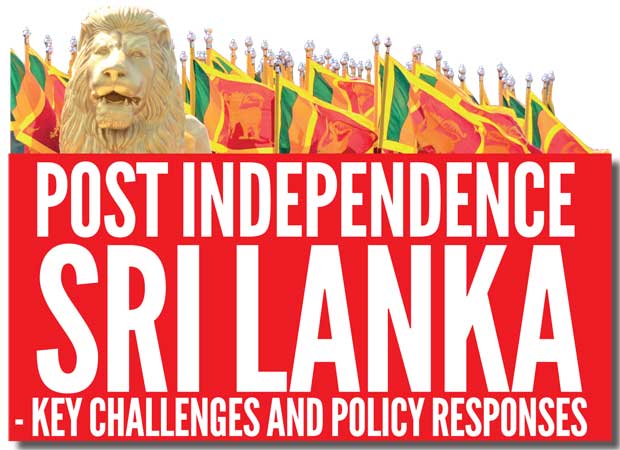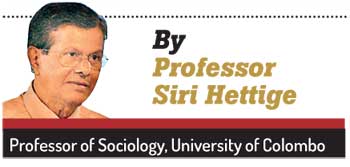Reply To:
Name - Reply Comment
Last Updated : 2024-04-20 08:36:00



e celebrated the 68th anniversary of the country’s political independence on the 4th of this month. The period that we have completed is as long as the average life span of a Sri Lankan citizen today. Some of us were not even born when the country gained independence but have lived during the post independence period as children, youth and adults. In other words, we have witnessed many things that happened during the period, be it political change, social and economic development, natural disasters, violent conflicts, etc.
Against the background of yet another anniversary of independence, it is appropriate to reflect on what can restrict our freedoms and some of the major challenges we are yet to overcome to ensure peaceful and contented lives for our people.
Many thinkers and writers have focused attention on various external threats to our freedom such as colonialism, slavery, dictatorial rule and economic exploitation. But what is equally important are the threats to freedom from within. In the latter case, we unwittingly or voluntarily subject ourselves to various forms of enslavement when we give up our freedom of thought. As a result, many people, having lost their capacity for critical thinking, become unreflective followers of others, be they demagogues, ritual healers, commercial interests or ultra-nationalists.
Colonial rule in Sri Lanka came to an end in 1948. Yet, we have experienced many threats to our freedom from time to time. At times, there have been serious threats to democratic rights, while, in other instances, we have given up our freedom of thought and action, almost voluntarily. In other words, we cannot simply engage in another anniversary celebration of our political freedom without reflecting on both persisting threats to freedom and how to overcome them. If we were to enumerate all the possible threats to freedom, it would no doubt be a long list. On the other hand, it is possible to identify the most important ones on the basis of their wider socio-political implications. These can be discussed under three broad themes, namely,
a) persisting ethno-nationalism that threatens peace and unity,
b) the lack of rational policy making
c) growing inequalities leading to social injustice and marginalization
Each of the above themes deserves detailed and in-depth analysis but they are discussed briefly in this article for want of space. The point that needs emphasis here is that all of them need to be addressed effectively in order to safeguard the freedoms and interests of the wider public.
Sri Lankans lost many years of peaceful life and basic freedoms to varying degrees, commencing from the early 1970’s. Many lost their lives. Some others lost their loved ones. A large segment of the population fled the country.
The impact of the ethnic war has been devastating for many, though others also suffered in numerous ways to varying degrees. One of the most significant impacts of the long drawn out conflict has been the diversion of much of the country’s scarce human and financial resources into warfare and this deprived many social and economic sectors of much needed resources. As we witness it today, the trend can not be easily reversed, even after many years since the end of the war. The opportunity costs involved have been enormous and cannot be recovered for many more years to come.
As is well known, it is the deep undercurrent of ethno-nationalism that prepared the ground for the devastating war. Though there are many people who trace the roots of the conflict to ancient history, the most significant fact is that exclusive ethno-nationalist identities and sentiments are continually reproduced through social, political and cultural processes today. We cannot change history but it is within our capacity to reform our institutions through rational public policies. We can change the segregated education system that continues to facilitate the reproduction of exclusive ethno-religious identities. We can teach languages and our children and youth can become at least bilingual. We can change our constitution and bring about political reforms. We can use the media to enlighten the general public rather than to arouse their primordial sentiments, etc. Yet, the political debates, both in and outside the parliament are not focused on rational policy making, often leading to ad hoc decisions on important national issues.
Finally, a word about persisting inequalities and injustices that also contribute to tensions and conflicts. As we all know, post- independence economic and social reforms empowered the rural lower classes, giving them opportunities for social mobility. But, unfortunately, these same reforms contributed to a reinforcement of ethno-nationalist divisions and sentiments. Many youths began to perceive the competition involved as a zero sum game and the minority youths began to feel that the reforms gave them a raw deal. More recent economic reforms produced greater inequalities, both social and regional, making upwardly mobile rural youth more vulnerable in an intensely competitive socio-economic environment.
Some of these youth have become receptive to calls for ethno-nationalist mobilization against perceived threats to the interests of their communities. It’s their sectarian world views shaped by a parochial education and a sense of marginalization that prepare them for ethnic politics at a time when the challenges facing the country and the wider public demand broadest possible collective action based on a vision for a shared future. It is this message that we need to get across to the citizens of the country, in particular the younger generations when we celebrate the 68th anniversary of our independence on the 4th of February.

Add comment
Comments will be edited (grammar, spelling and slang) and authorized at the discretion of Daily Mirror online. The website also has the right not to publish selected comments.
Reply To:
Name - Reply Comment
On March 26, a couple arriving from Thailand was arrested with 88 live animal
According to villagers from Naula-Moragolla out of 105 families 80 can afford
Is the situation in Sri Lanka so grim that locals harbour hope that they coul
A recent post on social media revealed that three purple-faced langurs near t